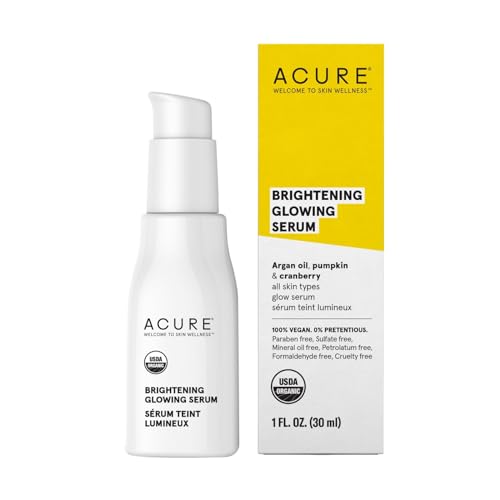
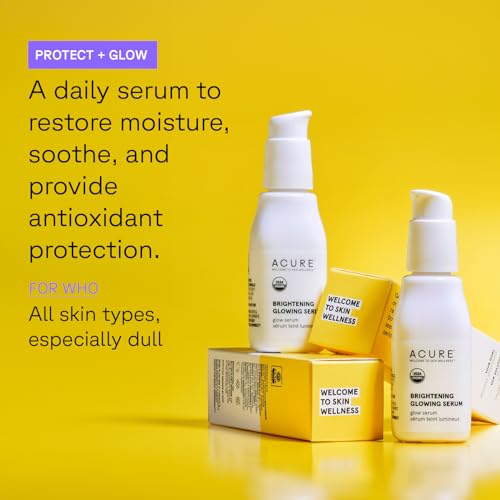
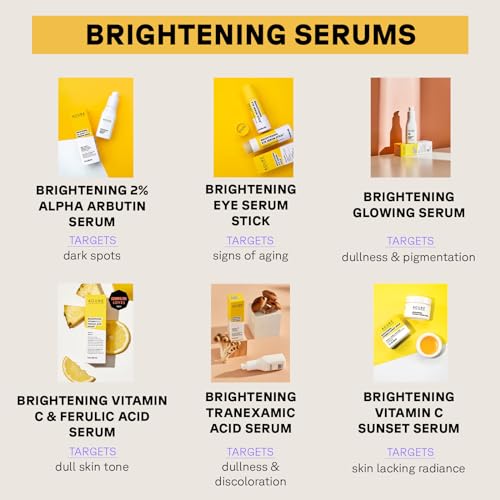
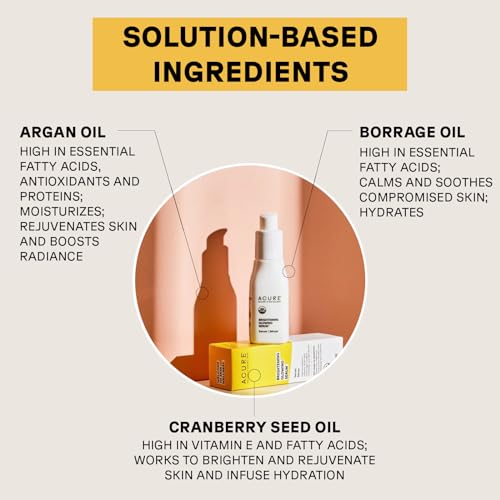
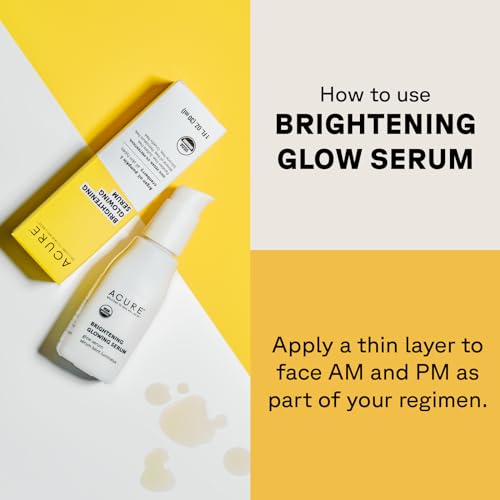
Acure Brightening Face Serum - Revitalizing Hydration & Antioxidant Protection - 1 Fl Oz


Rosmarinus Officinalis (Rosemary) Leaf Oil
Medium RiskRosmarinus officinalis (rosemary) leaf oil is extracted from the leaves of the rosemary plant. It is commonly used in cosmetic and personal care products for its aromatic properties and potential preservative benefits due to its antioxidant content.
Sustai Insights
Rosemary leaf oil offers functional benefits such as antimicrobial and antioxidant properties, which can enhance product stability. It is derived from a renewable source and is biodegradable. However, it presents moderate risks of allergic reactions and skin irritation, particularly with enhanced skin absorption. Regulatory bodies have noted restrictions on its usage in specific concentrations. The overall risk level is assessed as medium. Users are advised to follow safe usage practices and may consider alternatives like tocopherols or other natural preservatives.
Citrus Aurantium Dulcis (Orange) Peel Oil
Medium RiskCitrus aurantium dulcis (orange) peel oil is derived from the peel of oranges and is commonly used in cosmetic and personal care products for its fragrance and potential skin benefits. It is known for its aromatic properties and is often included in formulations aimed at enhancing scent profiles.
Sustai Insights
Citrus aurantium dulcis (orange) peel oil offers functional benefits such as providing a pleasant scent and potential antimicrobial properties. However, it poses a high allergy risk and may cause skin irritation in sensitive individuals. Environmental concerns include moderate persistence and potential to contribute to pollution. Regulatory warnings indicate restrictions on use in certain products. Overall, the risk level is assessed as medium, and users are advised to practice caution, particularly those with known allergies. Alternatives like sweet orange essential oil may provide similar benefits with potentially lower risks.
Carthamus Tinctorius (Safflower) Seed Oil
Low RiskCarthamus tinctorius (safflower) seed oil is derived from the seeds of the safflower plant. It is primarily used in cosmetic formulations for its emollient properties, helping to moisturize and soften the skin. The oil is rich in unsaturated fatty acids and is often employed in skin care products for its potential benefits to skin health.
Sustai Insights
Safflower seed oil offers functional benefits as a moisturizer and emollient, contributing to skin hydration without significant irritation. It is generally recognized as low risk concerning health impacts, with minimal concerns over carcinogenicity, allergies, and reproductive toxicity. Environmentally, it poses low risks, being non-bioaccumulative and not a significant pollutant. Regulatory bodies do not impose restrictions on its use, underscoring its safety profile. While there are no widely recognized safer alternatives, users should ensure proper application to mitigate any potential skin irritation. Overall, this ingredient is assessed as low risk.
Vaccinium Macrocarpon (Cranberry) Seed Oil
Low RiskVaccinium macrocarpon (cranberry) seed oil is derived from the seeds of the cranberry plant. It is commonly used in cosmetic formulations for its emollient properties, providing moisture and improving skin texture. The oil is rich in fatty acids and antioxidants, contributing to its popularity in skin care products.
Sustai Insights
Vaccinium macrocarpon (cranberry) seed oil offers functional benefits as a moisturizer and skin conditioner, contributing to product efficacy. It is sustainably sourced, with minimal environmental risks identified, resulting in a low overall risk level. Health concerns such as carcinogenicity, allergies, and reproductive toxicity are low, and there are no significant regulatory restrictions. Safe usage practices include ensuring proper formulation concentrations, with alternatives like jojoba oil available for similar benefits. Overall, the ingredient is considered low risk.
Cucurbita Pepo (Pumpkin) Seed Oil
Low RiskCucurbita pepo (pumpkin) seed oil is an oil extracted from the seeds of the pumpkin plant. It is primarily used in cosmetic formulations for its emollient properties, contributing to skin hydration and nourishment. The oil contains essential fatty acids and antioxidants, which may enhance the overall quality of skincare products.
Sustai Insights
Pumpkin seed oil offers functional benefits such as skin hydration and potential antioxidant effects due to its fatty acid composition. It is sustainably sourced and biodegradable, posing low risk for environmental pollution. Health risks are minimal, with low concerns for carcinogenicity, allergies, or endocrine disruption. Regulatory status is favorable with no current restrictions. Overall, the ingredient presents a low risk profile and is suitable for use in cosmetic products. Alternatives may include other plant-based oils with similar properties.
Olea Europaea (Olive) Oil
Low RiskOlea europaea (olive) oil is derived from the ripe fruit of the olive tree. It is commonly used in cosmetic formulations primarily as a moisturizer and emollient due to its nourishing properties for the skin. It also serves as a carrier oil for other ingredients in formulations.
Sustai Insights
Olea europaea (olive) oil offers numerous functional benefits, including effective moisturization and enhanced skin absorption properties, making it suitable for various cosmetic applications. It is a biodegradable ingredient, contributing to sustainability when sourced responsibly. Health risks are low, with minimal concerns regarding carcinogenicity, allergenic potential, and developmental toxicity. Environmental risks are also low, with no significant bioaccumulation or pollution potential noted. Regulatory bodies do not impose restrictions on its use. Overall, olive oil presents a low risk profile, making it a favorable choice in cosmetic products.
Borago Officinalis (Borage) Seed Oil
Low RiskBorago officinalis (borage) seed oil is an oil derived from the seeds of the borage plant, known for its high content of gamma-linolenic acid (GLA). It is commonly used in cosmetic formulations for its moisturizing properties and potential to improve skin barrier function.
Sustai Insights
Borage seed oil is valued for its moisturizing benefits and is considered sustainably sourced. It has a low risk of causing health issues, including carcinogenicity, allergies, or reproductive toxicity. Environmental risks appear minimal, with no significant concerns related to bioaccumulation or pollution. Regulatory bodies do not impose significant restrictions on its use. Overall, the ingredient is assessed as low risk, making it a suitable option in cosmetic products.
Argania Spinosa (Argan) Kernel Oil
Low RiskArgania spinosa (argan) kernel oil is a fixed oil extracted from the kernels of the argan tree, native to Morocco. It is commonly used in cosmetic formulations for its moisturizing properties, serving as an emollient and skin conditioner.
Sustai Insights
Argania spinosa kernel oil offers functional benefits such as effective hydration and nourishment for the skin and hair. It is sustainably sourced and biodegradable, contributing positively to environmental considerations. Health risks are low, with minimal concerns regarding carcinogenicity, allergies, or reproductive toxicity. There are no current regulatory restrictions on its use. Overall, it poses low risk, making it a suitable ingredient in cosmetic products. Safe usage practices should be maintained, and alternatives like jojoba oil may also be considered for similar benefits.
Lavandula Angustifolia (Lavender) Flower Oil
Low RiskLavandula angustifolia (lavender) flower oil is an essential oil derived from the flowers of the lavender plant. It is commonly used in personal care products for its aromatic properties and is known for its potential soothing effects in formulations.
Sustai Insights
Lavender oil provides functional benefits such as fragrance enhancement and potential calming effects, contributing to user experience in various personal care products. It is sustainably sourced and has low toxicity levels. Health risks associated with lavender oil are minimal, with low concerns for carcinogenicity, allergies, and reproductive toxicity. Environmental risks are also low, with no significant pollutant concerns. Regulatory assessments indicate no current restrictions, affirming its safety for use. Overall, the ingredient is considered low risk, making it a favorable choice in formulations.
Sesamum Indicum (Sesame) Oil
Low RiskSesamum indicum (sesame) oil is derived from the seeds of the sesame plant. It is commonly used in cosmetic formulations due to its emollient properties and ability to nourish the skin. This oil is rich in fatty acids and antioxidants, contributing to its effectiveness in various skincare products.
Sustai Insights
Sesame oil offers several functional benefits, including moisturization and nourishment for the skin, along with potential antioxidant properties. It is generally regarded as safe, with low concerns regarding carcinogenicity, allergies, and reproductive toxicity. Environmental risks are minimal, and the oil is not known to be bioaccumulative. Regulatory bodies do not impose significant restrictions on its use. Overall, sesame oil poses a low risk, making it a viable ingredient in cosmetic formulations, although consumers should consider potential allergies and choose responsibly sourced products.
Rosmarinus Officinalis (Rosemary) Leaf Oil
Medium RiskRosmarinus officinalis (rosemary) leaf oil is extracted from the leaves of the rosemary plant. It is commonly used in cosmetic and personal care products for its aromatic properties and potential preservative benefits due to its antioxidant content.
Sustai Insights
Rosemary leaf oil offers functional benefits such as antimicrobial and antioxidant properties, which can enhance product stability. It is derived from a renewable source and is biodegradable. However, it presents moderate risks of allergic reactions and skin irritation, particularly with enhanced skin absorption. Regulatory bodies have noted restrictions on its usage in specific concentrations. The overall risk level is assessed as medium. Users are advised to follow safe usage practices and may consider alternatives like tocopherols or other natural preservatives.
Citrus Aurantium Dulcis (Orange) Peel Oil
Medium RiskCitrus aurantium dulcis (orange) peel oil is derived from the peel of oranges and is commonly used in cosmetic and personal care products for its fragrance and potential skin benefits. It is known for its aromatic properties and is often included in formulations aimed at enhancing scent profiles.
Sustai Insights
Citrus aurantium dulcis (orange) peel oil offers functional benefits such as providing a pleasant scent and potential antimicrobial properties. However, it poses a high allergy risk and may cause skin irritation in sensitive individuals. Environmental concerns include moderate persistence and potential to contribute to pollution. Regulatory warnings indicate restrictions on use in certain products. Overall, the risk level is assessed as medium, and users are advised to practice caution, particularly those with known allergies. Alternatives like sweet orange essential oil may provide similar benefits with potentially lower risks.
Carthamus Tinctorius (Safflower) Seed Oil
Low RiskCarthamus tinctorius (safflower) seed oil is derived from the seeds of the safflower plant. It is primarily used in cosmetic formulations for its emollient properties, helping to moisturize and soften the skin. The oil is rich in unsaturated fatty acids and is often employed in skin care products for its potential benefits to skin health.
Sustai Insights
Safflower seed oil offers functional benefits as a moisturizer and emollient, contributing to skin hydration without significant irritation. It is generally recognized as low risk concerning health impacts, with minimal concerns over carcinogenicity, allergies, and reproductive toxicity. Environmentally, it poses low risks, being non-bioaccumulative and not a significant pollutant. Regulatory bodies do not impose restrictions on its use, underscoring its safety profile. While there are no widely recognized safer alternatives, users should ensure proper application to mitigate any potential skin irritation. Overall, this ingredient is assessed as low risk.
Vaccinium Macrocarpon (Cranberry) Seed Oil
Low RiskVaccinium macrocarpon (cranberry) seed oil is derived from the seeds of the cranberry plant. It is commonly used in cosmetic formulations for its emollient properties, providing moisture and improving skin texture. The oil is rich in fatty acids and antioxidants, contributing to its popularity in skin care products.
Sustai Insights
Vaccinium macrocarpon (cranberry) seed oil offers functional benefits as a moisturizer and skin conditioner, contributing to product efficacy. It is sustainably sourced, with minimal environmental risks identified, resulting in a low overall risk level. Health concerns such as carcinogenicity, allergies, and reproductive toxicity are low, and there are no significant regulatory restrictions. Safe usage practices include ensuring proper formulation concentrations, with alternatives like jojoba oil available for similar benefits. Overall, the ingredient is considered low risk.
Cucurbita Pepo (Pumpkin) Seed Oil
Low RiskCucurbita pepo (pumpkin) seed oil is an oil extracted from the seeds of the pumpkin plant. It is primarily used in cosmetic formulations for its emollient properties, contributing to skin hydration and nourishment. The oil contains essential fatty acids and antioxidants, which may enhance the overall quality of skincare products.
Sustai Insights
Pumpkin seed oil offers functional benefits such as skin hydration and potential antioxidant effects due to its fatty acid composition. It is sustainably sourced and biodegradable, posing low risk for environmental pollution. Health risks are minimal, with low concerns for carcinogenicity, allergies, or endocrine disruption. Regulatory status is favorable with no current restrictions. Overall, the ingredient presents a low risk profile and is suitable for use in cosmetic products. Alternatives may include other plant-based oils with similar properties.
Olea Europaea (Olive) Oil
Low RiskOlea europaea (olive) oil is derived from the ripe fruit of the olive tree. It is commonly used in cosmetic formulations primarily as a moisturizer and emollient due to its nourishing properties for the skin. It also serves as a carrier oil for other ingredients in formulations.
Sustai Insights
Olea europaea (olive) oil offers numerous functional benefits, including effective moisturization and enhanced skin absorption properties, making it suitable for various cosmetic applications. It is a biodegradable ingredient, contributing to sustainability when sourced responsibly. Health risks are low, with minimal concerns regarding carcinogenicity, allergenic potential, and developmental toxicity. Environmental risks are also low, with no significant bioaccumulation or pollution potential noted. Regulatory bodies do not impose restrictions on its use. Overall, olive oil presents a low risk profile, making it a favorable choice in cosmetic products.
Borago Officinalis (Borage) Seed Oil
Low RiskBorago officinalis (borage) seed oil is an oil derived from the seeds of the borage plant, known for its high content of gamma-linolenic acid (GLA). It is commonly used in cosmetic formulations for its moisturizing properties and potential to improve skin barrier function.
Sustai Insights
Borage seed oil is valued for its moisturizing benefits and is considered sustainably sourced. It has a low risk of causing health issues, including carcinogenicity, allergies, or reproductive toxicity. Environmental risks appear minimal, with no significant concerns related to bioaccumulation or pollution. Regulatory bodies do not impose significant restrictions on its use. Overall, the ingredient is assessed as low risk, making it a suitable option in cosmetic products.
Argania Spinosa (Argan) Kernel Oil
Low RiskArgania spinosa (argan) kernel oil is a fixed oil extracted from the kernels of the argan tree, native to Morocco. It is commonly used in cosmetic formulations for its moisturizing properties, serving as an emollient and skin conditioner.
Sustai Insights
Argania spinosa kernel oil offers functional benefits such as effective hydration and nourishment for the skin and hair. It is sustainably sourced and biodegradable, contributing positively to environmental considerations. Health risks are low, with minimal concerns regarding carcinogenicity, allergies, or reproductive toxicity. There are no current regulatory restrictions on its use. Overall, it poses low risk, making it a suitable ingredient in cosmetic products. Safe usage practices should be maintained, and alternatives like jojoba oil may also be considered for similar benefits.
Lavandula Angustifolia (Lavender) Flower Oil
Low RiskLavandula angustifolia (lavender) flower oil is an essential oil derived from the flowers of the lavender plant. It is commonly used in personal care products for its aromatic properties and is known for its potential soothing effects in formulations.
Sustai Insights
Lavender oil provides functional benefits such as fragrance enhancement and potential calming effects, contributing to user experience in various personal care products. It is sustainably sourced and has low toxicity levels. Health risks associated with lavender oil are minimal, with low concerns for carcinogenicity, allergies, and reproductive toxicity. Environmental risks are also low, with no significant pollutant concerns. Regulatory assessments indicate no current restrictions, affirming its safety for use. Overall, the ingredient is considered low risk, making it a favorable choice in formulations.
Sesamum Indicum (Sesame) Oil
Low RiskSesamum indicum (sesame) oil is derived from the seeds of the sesame plant. It is commonly used in cosmetic formulations due to its emollient properties and ability to nourish the skin. This oil is rich in fatty acids and antioxidants, contributing to its effectiveness in various skincare products.
Sustai Insights
Sesame oil offers several functional benefits, including moisturization and nourishment for the skin, along with potential antioxidant properties. It is generally regarded as safe, with low concerns regarding carcinogenicity, allergies, and reproductive toxicity. Environmental risks are minimal, and the oil is not known to be bioaccumulative. Regulatory bodies do not impose significant restrictions on its use. Overall, sesame oil poses a low risk, making it a viable ingredient in cosmetic formulations, although consumers should consider potential allergies and choose responsibly sourced products.
Experience radiant and revitalized skin with Acure Brightening Glowing Serum. Infused with nature's finest ingredients such as Argan Oil, Pumpkin, and Cranberry, this 100% vegan serum hydrates and protects, ensuring a glowing complexion for all skin types.
- Potent Natural Ingredients: Harness the power of Argan Oil, Pumpkin, and Cranberry for a nourishing and revitalizing experience that enhances your skin's natural glow.
- Deep Hydration: The unique formula penetrates deeply, delivering essential moisture to combat dryness and leaving skin feeling soft and rejuvenated.
- Antioxidant Protection: Packed with antioxidants, this serum shields skin from pollution and free radicals, promoting a youthful appearance.
- Vegan and Cruelty-Free: Enjoy a brighter complexion with a product free from animal-derived ingredients, aligning with your ethical values.
- Suitable for All Skin Types: Whether dry, oily, or sensitive, this versatile serum caters to everyone, making it a must-have in your skincare routine.
Subscribe & Save with Sustai
- Best Price Guarantee: Always enjoy the lowest prices on sustainable home essentials.
- No Surprises: We’ll notify you before shipping. No hidden fees, ever.
- You’re in Charge: Change, pause, or cancel your subscription anytime with ease.
- Eco-Friendly Deliveries: Our grouped shipments mean less packaging and lower emissions.
Join us on a sustainable journey. Special offers for a limited time! Prices and promotions may change.
Recommended Products
Experience radiant and revitalized skin with Acure Brightening Glowing Serum. Infused with nature's finest ingredients such as Argan Oil, Pumpkin, and Cranberry, this 100% vegan serum hydrates and protects, ensuring a glowing complexion for all skin types.
- Potent Natural Ingredients: Harness the power of Argan Oil, Pumpkin, and Cranberry for a nourishing and revitalizing experience that enhances your skin's natural glow.
- Deep Hydration: The unique formula penetrates deeply, delivering essential moisture to combat dryness and leaving skin feeling soft and rejuvenated.
- Antioxidant Protection: Packed with antioxidants, this serum shields skin from pollution and free radicals, promoting a youthful appearance.
- Vegan and Cruelty-Free: Enjoy a brighter complexion with a product free from animal-derived ingredients, aligning with your ethical values.
- Suitable for All Skin Types: Whether dry, oily, or sensitive, this versatile serum caters to everyone, making it a must-have in your skincare routine.

You can have at most 2 Sustainable Steals products in your cart
Customer Reviews
Customers’ View
Customers appreciate the effectiveness and natural formulation of the Acure Brightening Glowing Serum, noting its ability to enhance skin radiance and provide deep hydration. Many users highlight the quality of ingredients, such as Argan Oil and Pumpkin, which contribute to a soft and smooth complexion. The serum's pleasant, subtle scent also receives positive remarks, with customers describing it as earthy and enjoyable. While some find the serum a bit oily, most agree it absorbs well and leaves the skin feeling nourished. This product aligns with eco-conscious values, being 100% vegan and free from animal-derived ingredients. Overall, customers find this serum to be a beneficial addition to their skincare routine, promoting a healthy and glowing appearance.
AI-generated from the text of customer reviewsThis product is rated 4.6 of 5.0 stars.
It has received 5 reviews.




